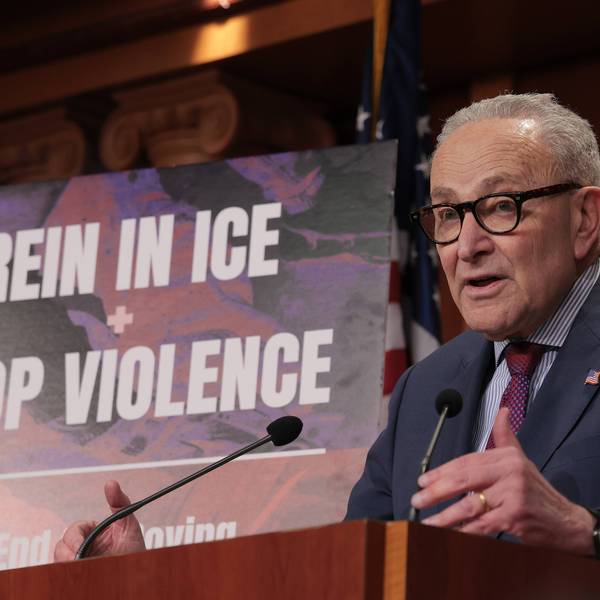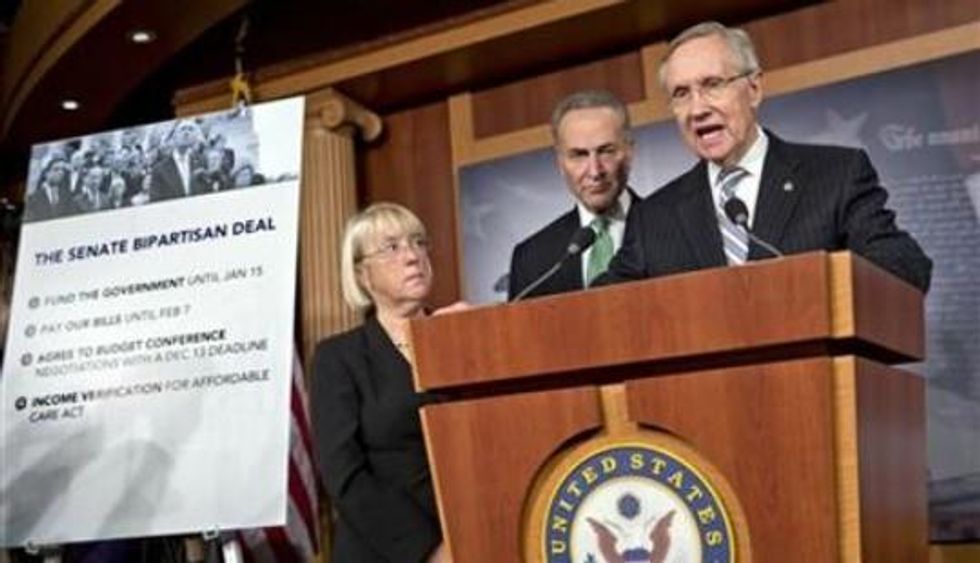The government shutdown is over, but the drive for
austerity endures.
President Obama, early Thursday morning, signed a bill passed by both chambers of Congress on Wednesday that reopened the federal government and raised the nation's borrowing limit, ending a more than two-week showdown in Washington that received near-constant media attention.
The Senate passed the measure with an 81-18 vote and the GOP-controlled House of Representatives followed with a 285-144 vote. In the House, 87 Republican joined all Democrats members who voted in favor, while 144 GOP members voted against.
Despite the end of the dramatics, however, progressive commentators note that no victories can be claimed in the political fight and warn that even with government workers back on the job Thursday and the threat of default now subsided, the painful austerity policies that have ruled Washington economic policy in recent years--including across-the-board spending cuts known as 'sequestration' and the continued push for further cuts to key social programs--remain dangerously front and center for lawmakers in both major parties. Such misguided policies, they claim, will continue to burden the economy with recession-like unemployment and make a true financial recovery for millions of middle class and working poor Americans impossible.
With or without the bipartisan deal, says Josh Bivens of the Economic Policy Institute, the "larger crisis is the extraordinary degree of spending-side austerity" which has been embraced in Washington since 2009.
"In fact," Bivens says, "this extreme cutback in public spending can entirely explain why the recovery from the Great Recession has been so sluggish compared to recoveries following previous recessions."
Citing empirical data, Bivens shows that the continued push by "deficit hawks" to cut programs like Medicare and Social Security has no sound basis in fiscal responsibility, but has been pushed--and will be pushed in the future--for purely political and ideological reasons.
That the drive to cut spending, Bevins writes, "particularly Social Security, Medicare and Medicaid--remains constantly in policymakers' cross-hairs is not a coincidence or the sad result of an analytical error." Instead, "it is instead an ugly but perennial part of American budget politics. Put simply, far too many assert that policy changes that inflict economic distress on low and moderate income households are by definition serious and durable and sustainable, while all other policy changes that result in lower deficits are not these things."
And according to Richard Eskow at the Campaign for Americas Future, the end of the government shutdown may have averted an immediate catastrophe, but says that Democrats will now "face powerful inducements in coming months to compromise with the austerity economics crowd by agreeing to a menu of further spending cuts, destructive entitlement "reform," and tax code tinkering that starves the government of needed revenue while protecting corporations and the wealthy."
Noting that the shutdown fiasco "wasn't the work of the Tea Party," but of the Republican Party establishment itself, Eskow warns that unless a progressive agenda--backed by an organized movement from the left--emerges in the next three months, "we'll be going through this whole charade again."
Articulating some of the possible demands and policy points to counter the austerity drive in Washington, Eskow's suggestions include:
- truly progressive tax reform, in which the wealthy and corporations pay their fair share;
- investment in jobs, growth, education, and our crumbling infrastructure;
- a more just economy, with improved social mobility, wage growth for the middle class, and opportunities for every American to better themselves through education and hard work;
- a line in the sand which protects Medicare, Medicaid and Social Security and strengthens them for future generations;
- a commitment to protect and defend the programs which care for the most vulnerable among us - children, families, and those who are most in need; and,
- an end to any tax break which encourages American companies to send jobs overseas.
_________________________________________________




